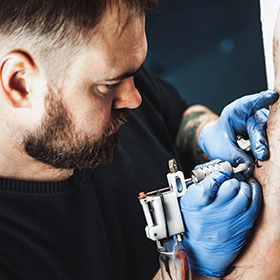Yes, the sun can be harmful to tattoos. UV rays from the sun can fade and damage your ink.
Tattoos are a beautiful form of self-expression, but they need proper care. Sun exposure is one of the biggest threats to tattoo longevity. UV rays can break down ink particles, causing colors to fade and blur. Even a short time in the sun can harm a fresh tattoo.
It’s crucial to protect your skin art from harmful rays. Understanding how the sun affects tattoos helps you maintain their vibrant look. In this post, we will explore how the sun impacts tattoos and provide tips on protecting your cherished ink from sun damage.
Sun Exposure And Tattoos
The sun can harm your tattoo. UV rays break down the ink. Colors may fade. Black ink turns grey. Bright colors lose their shine. New tattoos are most at risk. Always protect your tattoos from the sun.
The sun can damage your skin. Sunburns are painful. They can also harm your tattoo. Blisters may form. Peeling skin can ruin the ink. Use sunscreen. Cover your tattoo with clothes. Stay in the shade to keep your tattoo safe.
Why Uv Rays Matter
UV-A rays are long and can go deep into the skin. They can cause tattoos to fade over time. UV-B rays are shorter and cause sunburn. This can damage the tattoo surface. Both types of rays can harm tattoo colors.
Tattoo colors can fade due to sun exposure. Dark colors like black and blue may last longer. Light colors like yellow and pink can fade faster. Always protect your tattoos from the sun.
Immediate Effects Of Sun On Fresh Tattoos
Fresh tattoos are very delicate. The healing process needs care. Sun exposure can slow down healing. This can lead to infections. Always cover new tattoos. Use sunscreen if needed. Protect your skin.
Sunburn can damage fresh tattoos. Redness and swelling may occur. This can cause scarring. Damaged tattoos might fade. Blisters can form. They are painful. Sunburn can ruin the tattoo design. Be careful with new tattoos in the sun.
Long-term Sun Damage
The sun can make tattoos fade. Sunlight breaks down the ink. This causes colors to lose brightness. Black ink can turn gray. Blue and red inks can fade fast. Over time, tattoos might blur. Lines become less sharp. Details get lost. Always protect your tattoo from the sun.
Sun exposure can increase skin cancer risks. This applies to tattooed skin too. Tattoos don’t block harmful UV rays. Skin with tattoos can still burn. Burns can damage the skin and ink. It’s important to use sunscreen. Cover tattoos with clothing if possible. This helps keep skin and ink safe.
Preventative Measures
Sunscreen is very important for tattoos. Always use a sunscreen with high SPF. This protects your tattoo from the sun. Apply sunscreen every two hours. Reapply after swimming or sweating.
Wearing protective clothing can save your tattoo. Use long sleeves and hats. This will block the sun. Choose light and airy fabrics. They keep you cool and safe.
Choosing The Right Sunscreen
SPF stands for Sun Protection Factor. It shows how well sunscreen protects your skin. For tattoos, SPF 30 or higher is best. This level blocks about 97% of UVB rays. SPF 50 blocks around 98%. Higher SPF gives more protection. Choose a broad-spectrum sunscreen. It protects against both UVA and UVB rays. Always reapply sunscreen every two hours. Especially after swimming or sweating.
Some ingredients can harm tattoos. Avoid sunscreens with alcohol. It can dry out your skin. Fragrances can irritate your tattoo. Also, skip oxybenzone. It can cause skin reactions. Choose sunscreens with zinc oxide or titanium dioxide. These are safer for tattoos. They sit on top of the skin. They do not absorb into it. This keeps your tattoo safe and bright.
Aftercare Tips For Sun Protection
Keep your body hydrated. Drink plenty of water. This helps your skin heal better. Your tattoo will look vibrant. Dehydration can make your skin dry. Dry skin can damage your tattoo.
Moisturize your tattoo daily. Use a good quality, fragrance-free lotion. Avoid scented lotions. They can irritate your skin. Apply lotion gently. Do not rub hard. This keeps your tattoo soft and bright.
When To Avoid Sun Exposure
The sun’s rays are strongest between 10 AM and 4 PM. This is the time when UV rays can damage your tattoo the most. It’s best to stay in the shade or indoors during these hours. Protect your tattoo with clothing if you must go out. A wide-brimmed hat can also help.
Special days like beach trips or outdoor events may expose your tattoo to the sun. Always use a high SPF sunscreen on your tattoo. Reapply it every two hours, or more if you swim or sweat. Cover your tattoo with clothing if possible. A light scarf or long sleeve shirt can work well.
Conclusion
Protecting your tattoo from the sun is crucial. The sun can cause fading. This means your tattoo might lose its sharpness. Always use sunscreen on tattoos. Wear protective clothing when outside. Stay in the shade when possible. These steps help keep your tattoo looking fresh.
Remember, tattoos are an investment. Take good care of them. Your skin and tattoo will thank you. Keep your art vibrant and beautiful for years.

